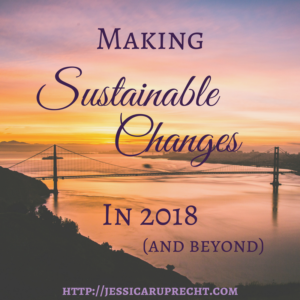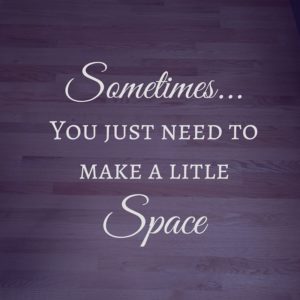 As I’ve been taking stock of 2017 and pondering where I might to let life take me in 2018, I’ve been thinking a lot about how we make changes in our lives. You see, in the past I’ve always struggled a lot with New Year’s Resolutions.
As I’ve been taking stock of 2017 and pondering where I might to let life take me in 2018, I’ve been thinking a lot about how we make changes in our lives. You see, in the past I’ve always struggled a lot with New Year’s Resolutions.
I’ve experimented with other ideas, like setting an intention world for the year, but honestly those things never really worked for me either.
But something magical happened last year: I picked up some new habits and I deepened some existing ones in a sustainable and lasting way.
In 2017, I meditated more regularly and for longer than I had in any year previously.
In 2017, I practiced yoga more regularly and for longer than I had in any year previously.
In 2017, I studied Russian more days that not, sometimes only for 10 minutes, sometimes for an hour or more.
In a lot of ways, even though 2017 didn’t turn out at all the way I had hoped and was harder than I had expected, I feel really good about these small accomplishments.
My meditation practice has deepened into something really beautiful that nourishes me daily. My yoga practice in conjunction with other things is slowly improving my chronic back pain. And I can have some simple conversations in Russian these days and understand a lot of simple texts.
So, this year, I would invite you to not set any resolutions but instead to find a couple of tiny habits that would make your life better if you developed them or existing habits that you might want to deepen.
I think so often we see the New Year as an opportunity to tear down everything we don’t like about ourselves and we think that this will allow us to finally build the life we’ve been longing for. But in my experience it’s making tiny little shifts and taking tiny little steps towards the things that we love that makes more of a difference than anything else.
So, if this sounds intriguing to you, then here are seven things you can do to make sustainable changes in 2018 and beyond.
Choose the right goals
This one sounds easy, but it’s really not. So often in the past when I have set goals for myself I have set all the wrong goals for all the wrong reasons. So here are a couple of tips for setting the right goals this year.
Don’t set goals just because you feel that you “should”. Don’t set goals that don’t light you up inside. If you’re already dreading the effort it will take to achieve something then please do yourself a favor and find a new goal — trying to grit your way through something unpleasant because you think the end result will be “worth it” is almost never the kindest thing you can do for yourself. Make sure the activities required to pursue your goals are mostly activities you genuinely enjoy.
Do set goals that make you happy, even if they don’t make any sense. Learning Russian makes no sense; I don’t have any use for the language except for a vague interest in reading Russian literature in the original. But the truth is that I just really love learning languages and it makes me really happy — if this is your only reason for setting a goal, let it be enough!
Don’t set goals just because everyone else is. I feel like most New Year’s resolutions fall into any number of cliches: lose weight, watch less TV, be less distracted, meditate more, etc. None of these goals is necessarily the wrong thing, but make sure you’re setting goals that really matter to you, not just blindly following along with the herd.
Make the time to begin
Here’s a simple truth that I believe is often easy to ignore: you’re already using every minute of your days. There are 168 hours in every week and for the last month you’ve spent each and every one of them — I guarantee it!
It’s easy to overlook this when we think about setting new goals for the New Year. We think “oh, I should exercise more” and so we buy a gym pass, but we overlook the part where actually going to the gym means taking 3-4 hours a week (or more) away from something else that we were already doing.
Making time for new habits inevitably means saying goodbye to something old.
For every habit you want to create in the new year, make sure you’ve decided what you’re willing to let go of.
And keep an eye on yourself as you begin to implement because it’s easy to dismiss the hours we spend surfing the web or bingeing on Netflix as “time wasted”, but for a lot of us these activities fill a real need for rest, relaxation, and recharging.
Make sure you don’t inadvertently throw out all of your down time in order to make time for “healthier” habits.
Expect to make mistakes
In the past, I’ve gotten myself into so much trouble by expecting everything to be perfect right from day one.
The truth about life is that it’s messy: some weeks you get sick, some days you’re exhausted, or there’s just a lot already going on and trying to squeeze in anything extra would just add extra stress.
This means that your new habits are going to fly off the rails. You’re going to be doing well and life is going to intervene with something you didn’t plan for, and it’s going to cost you an evening or a week or three months.
Expect this to happen. Let it be okay.
It’s important to have priorities and it’s important to be able to let go of what’s not so important when something truly urgent comes up.
Missing a day or two or three or four isn’t the end of the world. Just pick your habits up again when you can.
Practice self-forgiveness
Self-forgiveness is the secret elixir that makes it possible to fail at your goals over and over again without giving up.
Notice how missing a day or a week makes you feel. The truth is that feeling like you’re failing hurts: it’s disappointing, it feels like you’re letting yourself down, or those around you. And if you’re not careful, feeling like a failure deepens into the acrid bitterness of a constant self-loathing that lingers in the background, tainting everything.
So allow yourself to notice how it feels when the plan gets messed up. Notice if you’re judging yourself for not being good enough, notice if you’re hurting.
And then place your hands over your heart and feel their warmth in your chest and whisper to yourself, “Forgiven, forgiven.” You’re hurting, but nothing is irreparably broken that cannot be fixed.
It’s all going to be perfectly okay.
Learn to start over
Each time you fall off the wagon, practice noticing and self-forgiveness — and then, when you’re able, start over.
It’s so easy to get caught up in the idea that perfect execution looks like starting something once and then never failing, never stopping.
But this idea just isn’t realistic. So learn to start and stop and start over and over again. Just keep starting over whenever you need to, whenever you can.
Practice starting over by returning to the practice the same way we return to the breath in meditation. Don’t judge or make it into a big deal. Just notice and come back to the practice.
Every day is just another day to begin again. No big deal.
Celebrate how far you’ve come
The beautiful thing about this approach is that if you implement it diligently you really will make progress.
Focusing on the habits and goals that really matter to you every day and not expecting it all to go perfectly, but just forgiving yourself and starting over every time your habits get disrupted — it really works.
If you practice in this way, on the vast majority of days you do the things you intended to do. You make it to your yoga mat, your meditation cushion, and your Russian lesson.
At the end of the year when you look back at where you were when you started and where you are now you can see that real progress has been achieved, even though on any given day it didn’t really seem like hard work.
Let the cycle unfold over and over again
This practice doesn’t stop; it just keeps going. In 2018, I’m going to continue to deepening all of my existing practices and I look forward to seeing where those journeys take me.
And I’m going to start just one new thing: I’m going to set the intention to write more in 2018.
And, you guys, I’m starting so, so small with this goal because I’ve set this goal for myself so many times and disappointed myself so many times that I know that I need to be extra-gentle with myself.
So I’m starting not by writing more for this blog, or writing more poetry, or anything else.
I’m starting with my journal. Because writing in my journal has always felt safe and nourishing to me and I genuinely enjoy bringing my troubles to the page and finding my answers there.
And I’m not making any rules about how many times a week or how much I need to write. My intention is simply to honor the truth that my journal is a tool that supports me and makes me healthier and happier and that it would be a shame to overlook that.
My hope is that this journaling practice will begin to spill over into other kinds of writing, but I refuse to put that kind of pressure on myself right now. So for now, I’m starting here where my habit is so small and so enjoyable that it feels easy — and we’ll see where that eventually takes me.
I wish you the very best in 2018!
Much love,
Jessica
P.S. If this post resonates with you but you aren’t quite sure how to really apply it, I’d like to invite you to consider the option of private coaching with me. While the concepts that lead us to freedom are in some sense universal, the barriers are often very individual and working privately with a coach can be the most effective way to overcome your unique barriers and see real results. If this interests you, click here to schedule a free conversation with me and learn more about what I offer my private clients.
